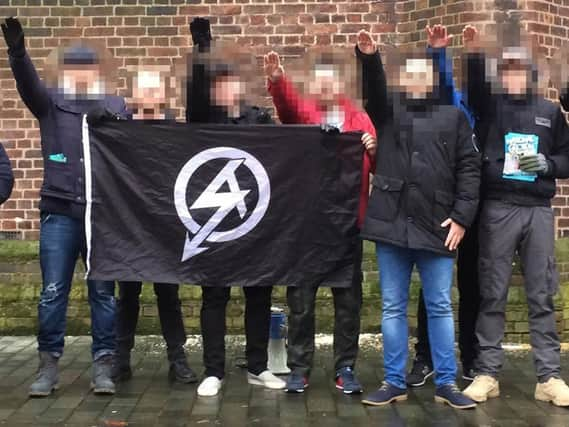Warning over 'gathering clouds' of far-right extremism following Covid-19 pandemic


Young extremists have been able to 'thrive' during the Covid-19 pandemic, a report claims, while research suggests the past year has 'accelerated' the demise of traditional far right groups.
The report compiled by the Hope Not Hate group claims that the lockdown has created the perfect breeding ground for extremist groups looking to recruit impressionable young people, while the far-right scene shifts towards "post-organisational" operations.
Advertisement
Hide AdAdvertisement
Hide AdHope Not Hate also says it has discovered a new extremist group called the 'National Partisan Movement' formed by up to 70 teenagers from across 13 countries, including England.


Researchers have now said that the economic fallout could be exploited by some activists looking to blame marginalised communities, and warned politicians of the dangers ahead.
"The health impact of Covid-19 will soon be eclipsed by the economic fallout from the pandemic, both as the furlough scheme ends here in the UK and as unemployment increases," the State of Hate report which is published today (Monday) reads.
"In the not-too-distant future, the Government will be reducing public spending and increasing taxes in order to reduce the huge deficit. As history has so often proved, economic hardship and pessimism can lead to a climate of fear and political hate.
Advertisement
Hide AdAdvertisement
Hide AdWhile the long-term economic impacts of Brexit also remain to be felt, Hope Not Hate said that it would increase the likelihood of Scotland voting for independence from the United Kingdom, which, it said, could lead to "an upsurge in a more bitter English nationalism".


The report points to a number of worldwide events last year which led to an increase in hate crime reports, tension and violence, including backlash to the Black Lives Matter protests and defacing of some statues, the Covid-19 pandemic being used against people of perceived Chinese ethnicity and the ongoing refugee crisis.
It also draws attention to the fact that, while 'traditional' far-right groups such as the British National Party appear to be on the decline, a growing number of extremist movements were appearing online through social media and encrypted messaging platforms like Telegram.
Some 12 people were convicted last year in the country's courts over offences relating to terrorism or proscribed groups – six of whom were teenagers.
Advertisement
Hide AdAdvertisement
Hide Ad"The exponential growth of the internet, 24-hour news and encrypted messaging platforms have completely changed the way the far right organises," the report said.
"Gone are the traditional political organisations, with their branches, membership cards and weekly offline activity, and instead we have increasingly nimble, short-lived networks where people come and go but share a common – hateful – outlook."
Nick Lowles, CEO of Hope Not Hate, said the immediate picture for post-pandemic Britain was uncertain, but that a struggling economy and unemployment were known to be used by the far-right to breed division.
"During lockdown the far-right have tried to blame minorities and foreigners for the virus itself," said Mr Lowles.
Advertisement
Hide AdAdvertisement
Hide Ad"For breaching lockdown and for hesitating over vaccinations. We have also seen the revival of white racial nationalism, which had been kept largely out of sight in favour of so-called ‘cultural concerns’."
He added: "The government has to support towns and cities in being resilient in the face of hate, helping places to cultivate the conditions that enable bonds across and between communities to grow and strengthen in adverse conditions."
Support The Yorkshire Post and become a subscriber today. Your subscription will help us to continue to bring quality news to the people of Yorkshire. In return, you'll see fewer ads on site, get free access to our app and receive exclusive members-only offers. Click here to subscribe.